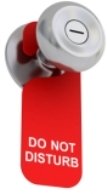The 4D Formula For Managing Interruptions

Managing interruptions well is an essential skill to learn if you want to make better use of your time at work.
The reality is that it’s almost impossible to avoid being disturbed during the day, but dealing with interruptions effectively saves you huge amounts of time that would otherwise be wasted.
It’s worth pointing out that distraction and disruption are two separate issues.
You choose to get distracted. No matter how interesting the diversion, it’s always your choice. For example, emails can send you off on a tangent.
You don’t choose to be disrupted. Someone, interrupts you - the phone rings, or a colleague walks into your office asking you something.
Going back to email -- they may distract you, but they should never need to interrupt you if you learn how to manage them effectively.
Expect to be interrupted. It’s bound to happen. For now, make dealing with interruptions a priority so you waste less time and do more good at work.
Whatever you do, ask yourself if it really is the best use of your time. Make it a habit to think about the impact what you’re doing now has on what you get done later. This will help you re-focus on your priorities.
Interruptions are random factors in your day. They will control you unless you control them. It’s your choice.
Interruptions caused by people
‘The average American worker has fifty interruptions a day, of which seventy percent have nothing to do with work.’
- ZW. Edwards Deming
‘Do you have a minute?’ means ‘Say yes, and you’ll pay for it’.
They may mean well; you may even welcome a break, but you can be sure it will stop your work. Keeping a time management log will open your eyes to the cost of pop-ins, chats and queries.
Not only do you have to count the cost of the interruption; you have to factor in the time it takes to get back to what you were doing beforehand.
4 ‘D’s for managing interruptions
Decide
Some work needs 100% focus. When are you least likely to be disturbed? That’s the time to do it.
For example, creating this website - being a dad to three children means I have to pick and choose when I can work, because creating pages (in fact, creating anything) takes thought and focus.
Decide when your quiet times are, then do your real work at those times.
Bottom line? Interruptions won’t affect you so much.
Defer
Feel brave? Just say No.
Soften it with an offer to meet up later, then agree a time and stick to it; remember, people judge punctuality.
Discourage
You can pre-empt a lot of interruptions without even speaking.
People notice body language (although you can bet you work with the one person who doesn’t).
Think about eye contact, posture and position before someone thinks about interrupting you.
Think you don’t know how to do this? You did it at school when the teacher asked the class a question and you didn’t want to be picked to answer.
Do
If their ‘sales pitch’ is good enough, you may choose to listen. If they talk too long, stand up, move nearer the exit or practice pay back - you interrupt them.
How? Find an errand to do and explain that you ‘just want to get it done’. Simple, honest and effective.
Another option is to break rapport. Reduce eye contact, stand rather than sit, flick bits of paper at them … whatever works. (Okay, maybe not the last one).
Then the phone rings...
What is it about a ringing phone that compels us to answer it?
It's an invitation to stall on whatever you’re doing.
Me? I make a point of ignoring it. I make my voicemail earn its keep, and I recommend you do that too. If you don’t use it, you’re more likely to become caught up in conversation. The disruption becomes a distraction.
If you do decide to pick up, and they want to talk for a while, follow the Defer principle above.
Another option, for when you really want to be left in peace, is to turn your phone off. Just remember to turn it on again later.
Managing interruptions well means you get more real work done.
But there’s a down side...
All work and no play is no fun
Sometimes, deep down, we want to be interrupted. Your work may be important; you may even be skilled at managing interruptions to it; but it can’t all excite you.
Best response? Apply the suggestions given above for ‘Decide’. Do your real work when you know you won’t be disturbed.
Oh, and don’t forget to go out and buy a decent 'Do Not Disturb' sign.
- Home ›
- Time Management in the Workplace ›
- Managing Interruptions

